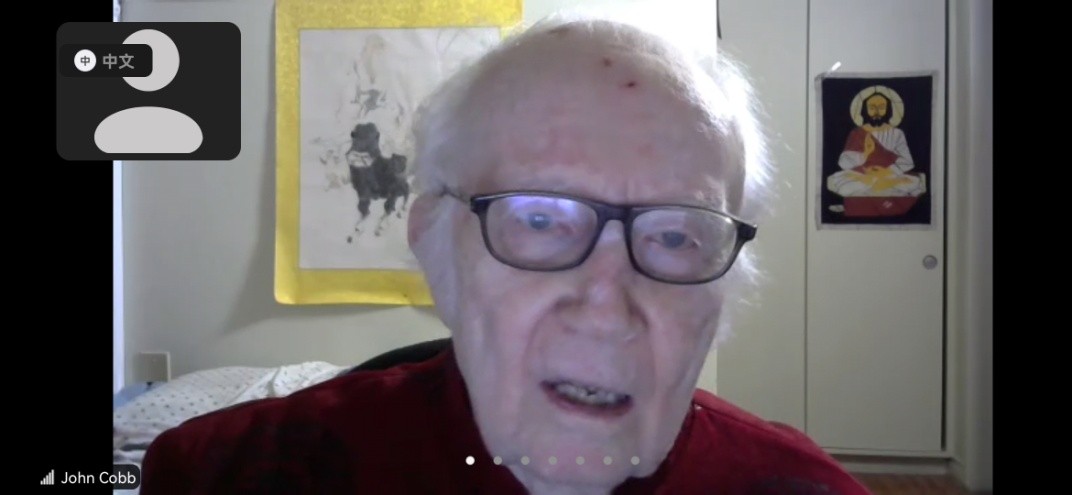亲爱的诗人们,亲爱的中外朋友们,
首先,请允许我代表中美后现代发展研究中心祝贺过程诗学国际论坛开幕。
尽管许多诗人以过程的方式描绘世界,但过程运动更为人所知的是严谨的思考, 而不是诗意的表达。这太糟糕了。严谨和诗意之间本没有冲突的必要。过程思维本 就不提倡思想与感受的分离。思维总要与纯粹和不纯粹的理解有关,而所有的理解 又都有主观的形式。也就是说,所有的思想都不只是记录客体的存在,其中也包含 着很多想法。而思想包含想法的主观形式就是情感。
当然,情绪会扭曲思想。如果一个人恨某人,那么他对这个人的观察就难以准 确。爱也会造成思想的扭曲。所以擅于思考的人总要尽力不受情绪干扰。
诗人往往是思考者。但他们的思考非常注重特定言辞表达所引起的情绪。在这 方面,他们并不孤单。宣传者也非常关注其话语或发声所引发的情绪。但严肃诗人 则切望其遣词造句能启迪听众或读者去感受经历中常被忽略的方方面面。
当然,许多文章全无诗意,但也有文章写得诗意盎然。还有诗歌写得俗白堪比口水文。诗与文并无泾渭分明的界线。此外,文和诗都可以有些许宣传色彩,即便 不提供证据,也能唤起有助于讲者或其事业的信念。
有经验的讲者或教师主要的兴趣在于让听者了解,如果能听懂听明白,他们将 从中如何受益。但老师们知道,除非能始终吸引住观众或学生的兴趣,否则不管他 们的论证多出色,描述多精确,人们真正能听进去的其实极其有限。而诉诸与所说 内容相关的情感就会自然讲出诗化的语言。
怀特海的著作,尤其是那些最初是公开演讲的作品,通常都具有这种论证出色、 描述精确的品质。当他主讲吉福德讲座时,人们本对这种高品质内涵的演讲满怀期 待,但乘兴而来却失望而归。怀特海的注意力完全集中在了内容的准确、精当和完 整上。他《过程与实在》的演讲成了一场灾难。首晚听众济济一堂来了 600 人,到 最后只有 6 位坚持把整个系列听完。怀特海作为演说家的名声算是砸了。但这本书 的内容在原创性、准确性和重要性方面都是无与伦比的。这既说明纯文章亦有其地 位,但又暗示,越是这样的文章,对诗性的需求更大。思想,就是能活化和指引个 人和群体生活和思维的种种潜力。但是,除非思想以足能唤起深层情感的方式组织 表达出来,否则它的潜质就仍然尚待实现。
诗歌就是思想这种潜力的满格实现。预祝大会成果丰盛,多多让此等思想圆满呈现。

(小约翰·柯布,世界著名后现代思想家、中美后现代发展研究院创院院长、美国人文与科学院院士)
Process Thinking Expects Poetic Expression
John B. Cobb, Jr.
Dear Poets, Dear Friends, Chinese and Non-Chinese,
First of all, please allow me to extend my congratulations to opening of the International Forum on Process Poetry on behalf of the Institute for Postmodern Development of China.
Although a good many poets depict the world in a process way, the process movement is better known for rigorous thinking than for poetic expression. That is too bad. There is no necessary conflict between these. And in the case of process thinking, it discourages their separation. Thinking has to do with pure and impure prehensions, and all prehensions have subjective forms. That is all thinking deals goes beyond merely registering the existence of an object. It entertains ideas. And the subjective form of entertaining ideas is emotion.
Of course, emotion can distort thought. If one hates someone it is hard to be accurate in one’s observations. Love may also distort. When one is thinking well one tries not to allow emotions to distort.
Poets are often thinkers. But they are thinkers who pay close attention to the emotions that particular verbal expressions arouse. They are not alone in this. Propagandists focus on the emotions aroused by their word or other sounds that they make. Serious poets, on the other hand, want the words they use to open their auditors or readers to neglected aspects of their experience.
Of course, much prose is not at all poetic, but other prose borders on poetry. Also, some poetry borders on prose. There is no sharp line. Also, both prose and poetry can have a propagandistic tinge, an effort to evoke beliefs that will help speakers or their causes without providing evidence.
A skilled lecturer or teacher is primarily interested in getting listeners to learn what they will benefit by knowing and to understand more clearly. But they know that unless they hold the interest of their audience or students, however brilliant their proofs and precise their descriptions, little will be really heard. Attending to the emotions associated with what is said may lead to quasi-poetic language.
Whitehead’s writings, especially those that began as public lectures, often have that quality. When he gave the Gifford Lectures, people came expecting that kind of speaking.But they were disappointed. Whitehead’s attention was entirely devoted to the accuracy and precision and completeness of the content. As lectures Process and Reality was a disaster. Of the 600 people who came the first night, only six came back. Whitehead ruined his reputation as a speaker. But the content of the book is unsurpassed in its originality, accuracy, and importance. Pure prose has its place. But the implication of the prose is that the need for poetry is even greater. The ideas are potentials for enlivening and directing individuals and groups in life and thought. But until they are formulated in ways that evoke deep emotions, their potential is unrealized.
Poetry is the fullest actualization of that potential. May your conference be rich in such actualizations.
附:首届过程诗学国际论坛
主题:生态文明时代诗人何为?---过程诗学的贡献
主办:美国中美后现代发展研究院,柯布研究院,美国过程研究中心
主持:凯瑟琳•里夫斯(美国过程诗人,美国柯布研究院负责人)
主持:樊美筠博士(过程美学家,美国过程研究中心中国部主任)
主要演讲嘉宾:
柯布院士(美国中美后现代发展研究院创院院长,美国人文与科学院院士)
杰伊•麦克丹尼尔教授(美国著名过程哲学家,国际生态文明联盟主任)
白鸦先生(中国著名诗人,过程诗学创始人)
安德鲁•施瓦茨博士(美国过程研究中心执行主任)
王治河博士(美国中美后现代发展研究院执行院长)
王晓华博士(深圳大学文学院教授)
论坛第一天:美国西部时间11月19日5:00pm-8pm
北京时间11月20日上午9:00-12:00
主持人凯瑟琳•里夫斯致开幕辞
柯布院士致辞:过程思维期待诗意的表达
安德鲁•施瓦茨博士致辞:诗歌可以激发我们对生机盎然的地球的悲悯情怀
大会主旨发言:白鸦先生:过程诗学:生态文明时代的诗歌自觉
大会主旨发言:杰伊•麦克丹尼尔教授:过程诗歌的12大主题
中国过程诗人张口:生态诗教
中国过程诗人巫小茶:长洲岛历险记
中国过程诗人茧衣:直接的诗,把世界打开到一半
中国过程诗人贾假假:诗的动机
中国过程诗人庄梦媛:过程诗学、超级人类与理想国
中国过程诗人树弦:我在石阡亲自生活
中国过程诗人马映:以“过程之眼”看女性诗歌写作
中国过程诗人榛莽:真诚是微妙的自然心法
俄罗斯诗人达蕊娅•济科维奇:俄罗斯过程诗歌的根源:白银时代的诗歌
匈牙利诗人格朗皮埃尔•阿提拉:世界过程之窗
王治河博士:生态文明时代诗人何为?
大会互动/会议结束
论坛第二天:美国西部时间11月20日5:00pm-8pm
北京时间11月21日上午9:00-12:00
主持人凯瑟琳•里夫斯致欢迎辞
美国诗人维罗妮卡•米查洛夫斯基(Veronica Michalowski)作品分享
美国诗人理查德•邦斯(Richard Bunce)作品分享
美国诗人乔吉特•尤里斯(Georgette Unis)作品分享
美国诗人凯瑟琳•里夫斯(Kat Reeves)作品分享
美国诗人厄尼•塔明加(Ernie Tamminga)作品分享
美国诗人卡罗尔•罗斯(Carol Rose)作品分享
美国诗人安德鲁•戴维斯(Andrew Davis)作品分享
樊美筠博士: 怀特海的“因果效验与诗”
王晓华博士:中国过程诗歌的几个关键词
大会互动/闭幕式



